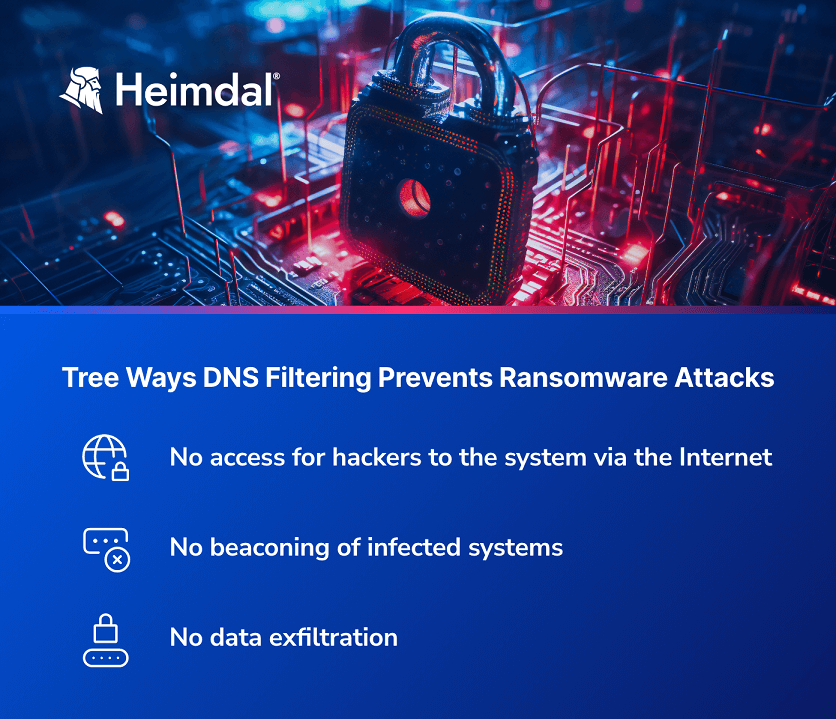Contents:
As malware and attack techniques continue to evolve in sophistication, DNS IoCs help threat hunting teams to prevent ransomware attacks. Prioritizing threat hunting to prevent and mitigate advanced threats is critical to safeguarding an organization`s data and assets.
The red flags that DNS IoCs raise when an infected system attempts to establish malicious communication are pure gold. Checking for DNS Indicators of Compromise (IoCs) gives you the possibility to stop inbound or outbound malicious traffic on the spot.
By actively monitoring DNS-layer activity and leveraging IoCs, security teams can detect and block threats before they cause any harm.
Ransomware Attacks’ Impact on Organizations Worldwide
Ransomware is a type of malware that blocks users’ access to their operating systems or files until a ransom is paid. Ransomware attacks have severe consequences for organizations. Beyond potential financial losses resulting from paying the ransom, companies risk credibility damage, loss of customers, and even employee complaints.
The Antivirus Guide’s statistics reveal that there were 236.1 million ransomware attempts in the first half of 2022 alone, with 26 new ransomware families discovered that year. While Windows and Mac OS remained the most targeted endpoints, Linux ransomware has experienced a 146% increase. The United States is currently the most targeted country, accounting for 51% of attacks, followed by the UK at 10%.
Furthermore, The Verizon Data Breach Investigation Report 2023 states that ransomware was present in 15.5% of all analyzed incidents in the past year. So, ransomware continues to be a significant concern for security administrators.
How DNS Security Helps Prevent Ransomware
The Domain Name System (DNS), which is essential in the highly digitized world that we live in, also plays a crucial role in an organization’s overall cybersecurity strategy. Customers use the DNS to interact with companies and their products. Employees rely on it to access needed websites, while marketing teams use it for communication and evaluating campaigns` impact.
Since its creators did not build DNS with security in mind, in time hackers found various ways to leverage it in cyberattacks. Something as simple as owning a website, searching on Google, or sending an email involves using the DNS and exposes you to becoming a potential target.
In a ransomware attack, the first thing that hackers have to achieve is deploy the malicious software through email, desktop sharing apps, or web applications. It`s an essential step for any ransomware attack. All of the above imply creating a connection between the malicious actor and the victim. Malicious connections exploit DNS as a gateway.

DNS filtering engines prevent a ransomware attack to succeed at three levels:
- It detects and blocks malicious communication the very moment an unsuspecting user clicks a harmful link. So, the hackers can`t infect the system.
- Detects abnormal behavior when an infected system beacons to the command-and-control server for instructions & additional malware. Once again, it identifies the malicious connection and blocks it on the spot.
- Detects and blocks communication when the C&C attempts data exfiltration.
So, paying attention to what DNS IoCs have to say and using a DNS filtering solution means:
- No access for hackers to the system via the Internet,
- Zero beaconing of infected systems,
- No data exfiltration.
Thus, securing the DNS perimeter is vital in ransomware prevention and safeguarding an organization’s assets.

- Granular telemetry across endpoints and networks.
- Equipped with built-in hunting and action capabilities.
- Pre-computed risk scores, indicators & detailed attack analysis.
- A single pane of glass for intelligence, hunting, and response.
DNS IoCs and Ransomware Prevention
Monitoring DNS-layer activity and leveraging IoCs helps security teams stop any communication to and from malicious servers, and also collect valuable insights for incident response.
DNS IoCs tell security teams when and where to act. They turn up the red light when an infected system is trying to establish communication with a command-and-control server. Also, DNS IoCs provide valuable information for incident response and forensics.
Unusual DNS requests that help prevent ransomware attacks:
- Suspicious DNS query failures
- Unrecognized Domain name requests
- Off-the-schedule DNS queries
- Unexpected DNS Queries volume
- Denied Outbound Traffic
DNS threat hunting is vital for mitigating and preventing ransomware attacks. In the fast-paced digital environment that we live in, automatization of processes is the key. So, instead of manual searching huge databases and exposing the team to alert fatigue, do it the easy and efficient way.
Check out Heimdal`s DNS Security Endpoint and DNS Security Network products. Both are powered by a state-of-the-art two-way DNS filtering engine. They use unique AI and machine-learning technology to discover malicious domains that were not yet marked as such. Additionally, Heimdal`s AI & Machine-Learning algorithm was proofed able to detect unknown malicious domains with a 96% accuracy.
For organizations with large and complex attack surface though, the best choice is Heimdal`s Threat hunting & Action Center (TAC). TAC is a revolutionary platform that displays various tools and features, Threat Prevention Endpoint and Network included, onto the same dashboard.
Go through our case study section if you feel like hearing from other users` experience and book a free trial to see the solution at work.
If you liked this article, follow us on LinkedIn, Twitter, Facebook, and Youtube, for more cybersecurity news and topics.










 Network Security
Network Security
 Vulnerability Management
Vulnerability Management
 Privileged Access Management
Privileged Access Management  Endpoint Security
Endpoint Security
 Threat Hunting
Threat Hunting
 Unified Endpoint Management
Unified Endpoint Management
 Email & Collaboration Security
Email & Collaboration Security







